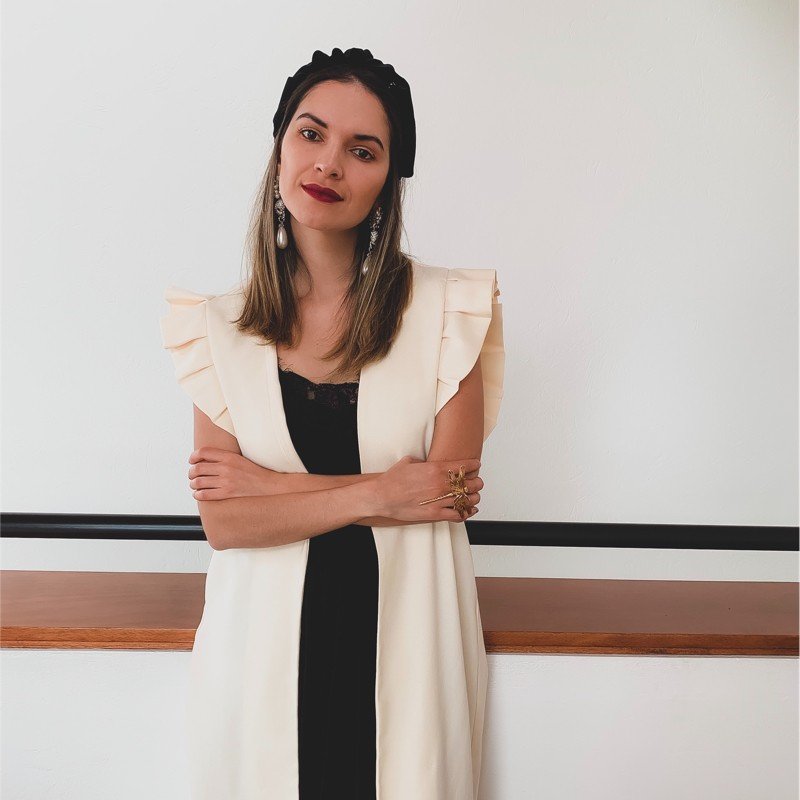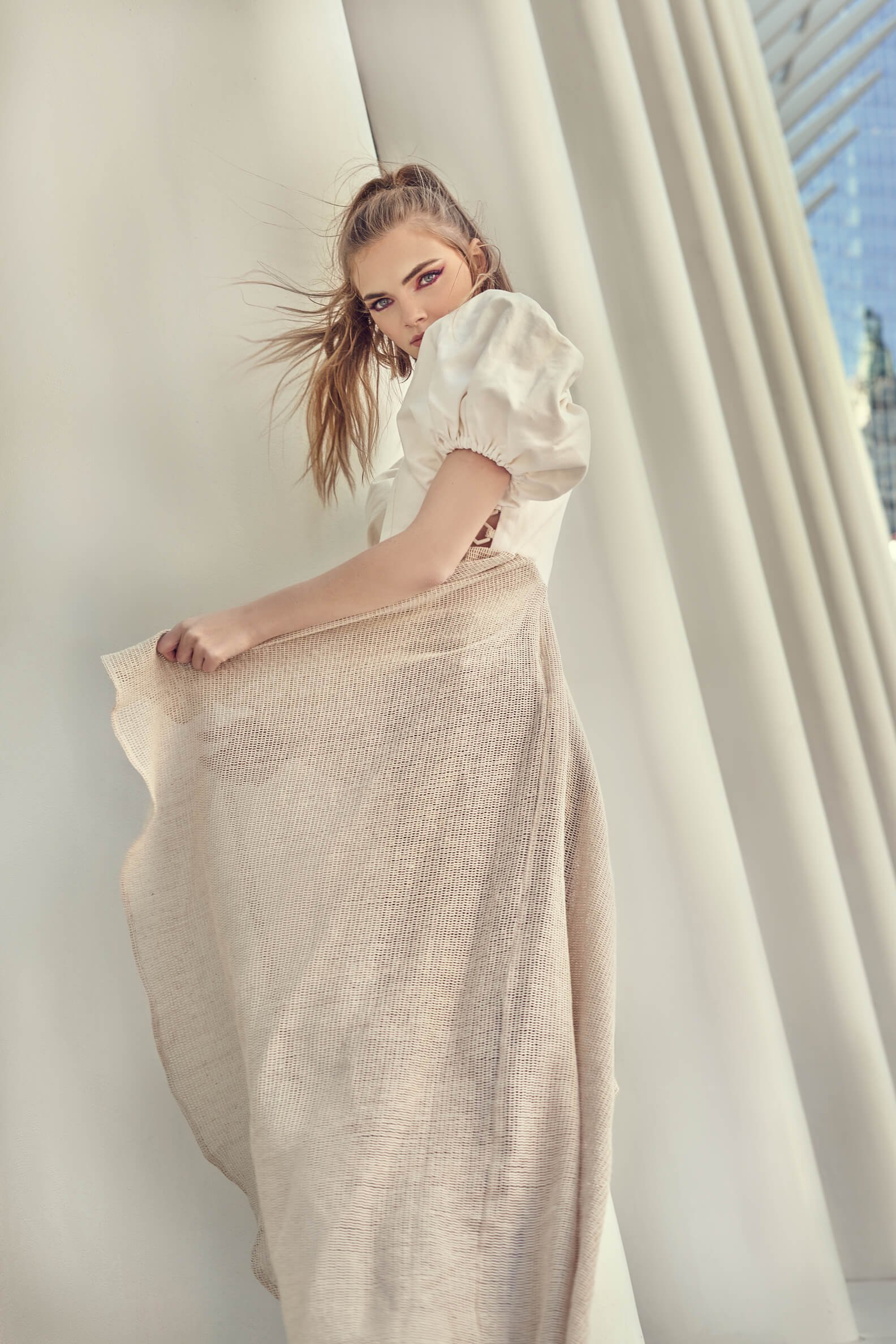Meet Daniela Cote the Founder of the Colombian brand MATERGEA
From the Caribbean to the Pacific coast, and the Andes to the Amazonian jungle, Colombia ranks third place among the most biodiverse countries in the world. It is home to the Earth’s widest variety of butterflies, birds, and orchids. For thousands of years, indigenous communities have been the guardians of this environment, protecting their lands. Their deep interaction with the ecosystems is visible even in their art and clothing.
Designs in the garments of Colombia’s indigenous peoples often use motifs from their environment. The patterns of Vueltas hats woven by the Zenú people are inspired by the corn spike, the orange blossom, and passion fruit flowers. Likewise, the textile designs of the Wayuu people allude to the rabbit’s teeth, the cow’s nose, the eye of a fish, the shell of a turtle, or a fly’s head. The admiration of natural elements influenced their aesthetics and perception of beauty.
Colombia has many rich traditions in handmade crafts. Such crafts are made with patience, persistence, and dedication passed down from older generations. When you buy a craft there, it is very likely that it was designed the same way it’s been made for centuries. One person who honors the culture and works closely with local artisans is Daniela Cote, the Founder and Creative Director at the Colombian slow fashion brand MATERGEA. She specializes in the fashion business and media content. Her educational background in journalism and luxury brand management helped her create consistent storytelling about the mission of MATERGEA.
Daniela Cote
Daniela wants to redefine fashion for a better world. Her passion for nature is visible in colors, shapes, and the creation of clothes and bags. MATERGEA uses Nopal cactus leather, hemp fabrics, and recycled cotton and PET bottles. Their products are eco-friendly, suitable for vegans, and free from toxic chemicals, phthalates, or PVC. Some of their bags have handles that look like jewelry and they are made of a very special material, Tagua, which closely resembles ivory. This is a nut of the palm tree Phytelephas Aequatorialis, which grows in tropical rainforests of South America. Indigenous people from these regions believe that wearing Tagua brings harmony to relationships with family and friends. Tagua represents feminine energy. Among MATERGEA’s flagship products is also a bag in the shape of a lotus flower with a bamboo handle. All of their beautiful pieces are packed in cotton bags and boxes made of sugar cane.
MATERGEA’s Atelier is located in Bogota. Daniela emphasizes the importance of the unhurried process of creation. She embraces handmade and long-lived crafts. Among her designs, you will find timeless colors - natural and earthy tones such as green, brown, nude, lilac, mustard, black and white. Daniela also proves that vegan bags can be solid and look luxurious at the same time. Best of all, no animals were harmed in the making of these products.
Please take your time to read this interview with Daniela and learn more about the MATERGEA brand.
What is your definition of fashion?
I think that fashion defines us. It is an important way that we express ourselves and create a bond with our personality through our clothes and accessories.
What was the greatest lesson you ever received as CEO and Creative Director of MATERGEA?
Never assume or take anything for granted. The fashion industry is a constant lesson of perseverance and patience.
What and who inspires you?
My biggest inspiration is Mother Earth. The core of MATERGEA is respect for nature, that is the reason why we create pieces made with sustainable materials such as hemp, tagua, vegan cactus leather, organic cotton, and recycled PET bottles. I think Mother Earth is such a big inspiration in so many ways, her magic and beauty are endless.
If you could describe MATERGEA in 3 words, what would they be?
Sustainable, Craftsmanship, and Unique.
How do you want women to feel when they wear your clothes & bags?
I want women to feel empowered when they take responsibility for their fashion choices and make sustainable choices. I want women to know that they are wearing a piece that describes them perfectly and that they are living in accordance with their values.
The MATERGEA woman is a woman who cares about the environment and who knows that the sustainability factor and unique design pieces are really important.
What is your favorite fabric and why?
I definitely have three favorites: hemp, tagua, and vegan cactus leather.
Hemp is one of the most sustainable fibers out there, it is stronger than cotton and can last for decades. Also, it is a compostable, breathable, and UV resistant organic material, all of which are really big pluses.
Tagua is also known as vegetable ivory due to its color, hardness, and durability. These natural seeds are an amazing material that is found in the Amazon and forests of South America.
Vegan cactus leather is an innovative material made in Mexico by Desserto. It saves water during manufacturing, and it’s free from toxic chemicals, phthalates, or PVC. It is a perfect option to replace animal leather that causes so much harm to the environment and the animals.
What can the fashion industry do to be more sustainable?
One of the biggest issues in the fashion industry is definitely fast fashion. And although these huge companies in the industry try to cover up the problem with greenwashing campaigns, they continue to churn out disposable clothing. They know that the only way out is by implementing more sustainable materials, creating fewer collections a year, and adding more recycled and reused materials to their supply chain processes.
How can we change the behavior of consumers to make more conscious purchasing decisions?
It is no secret that the fashion industry is the second biggest polluter in the world.
Facts and data are out there, and consumers know about this issue, so it is really a matter of what the consumers value at this point. Consumers really need to question how their purchasing affects the future they want to leave for future generations.
How do you think fashion will change in the future?
Hopefully it will change for the better. I think that nowadays many consumers are starting to change the way they consume fashion. They are starting to pay more attention to quality and sustainability instead of quantity and waste.
If we are both lucky and determined enough, we can force governments to take action and force the fast fashion industry to reduce their pollution and waste. But this is a change that will not happen overnight, and for this change, it is necessary that consumers begin to demand more environmental rights for a better future.





